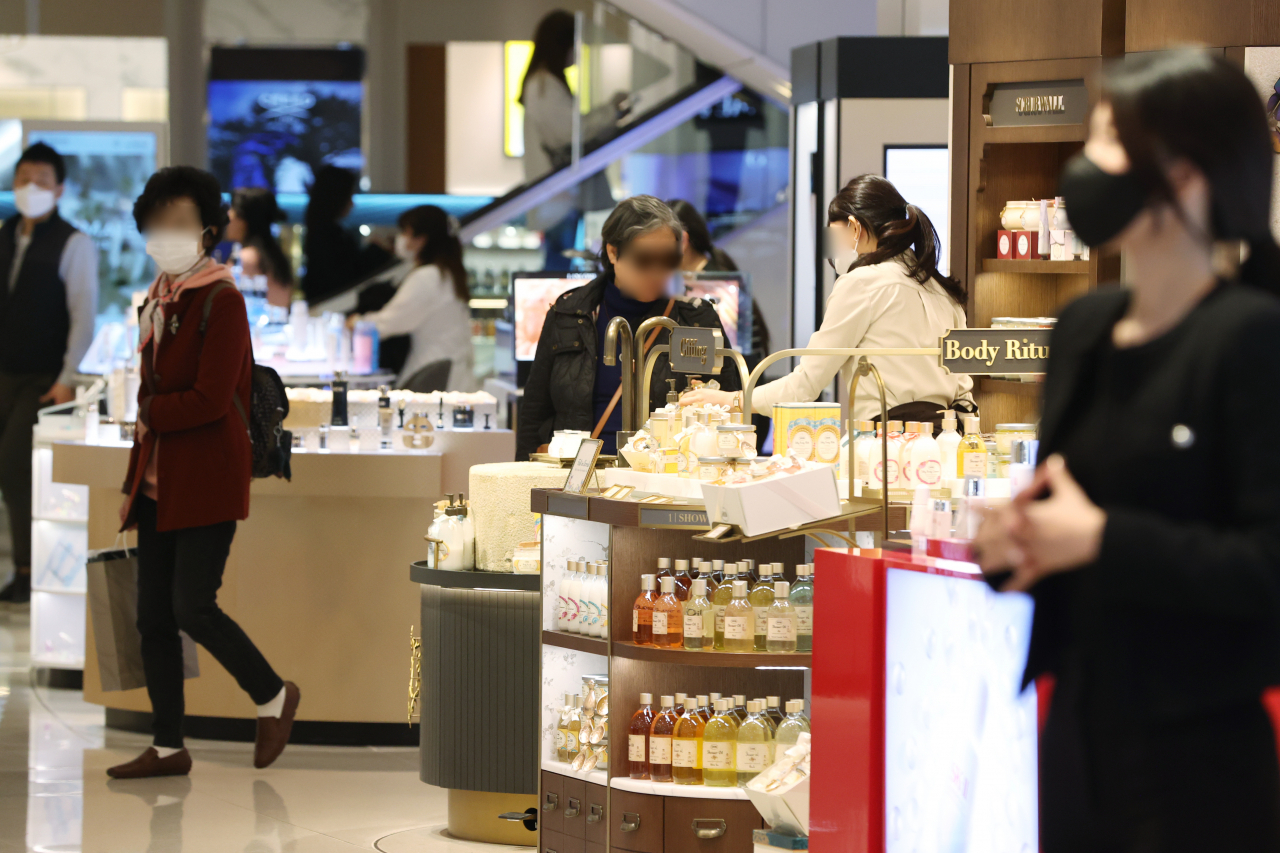Market Now
Korea mulls measures to spur spending amid inflation woes
 |
Visitors shop at a department store in Seoul. (Yonhap) |
The government is expected to unveil its scheme to invigorate domestic spending and tourism this week, amid stagnant exports struggles, to shore up the economy.
The Ministry of Economy and Finance and Ministry of Culture, Sports and Tourism are drawing up measures chiefly aimed at reviving the local tourism industry, which remains depressed in the aftermath of the COVID-19 pandemic.
Authorities are looking at ways to launch a coupon program that provides a certain discount when booking hotels and resorts in the country, as well as expanding the volume of issuance of vouchers for shopping at traditional markets.
Last year, the government ran a similar program, offering discounts of some 30,000 to 40,000 won ($23-$31) for accommodation reservations. Coupon users were found to have spent about 11 times the amount of support they received during their travel, according to government data.
Spurring private spending through such programs comes as sluggish consumption coupled with a continuous decline in exports could push the economy either into recession or a further slowdown.
Earlier this month, Finance Minister Choo Kyung-ho hinted at rolling out plans to expand domestic consumption. “Amid the recent sluggish exports centered on semiconductors, there is a sense of the problem that consumption should be activated a little more due to difficulties in the people's livelihoods,” he said.
Local think tank Hyundai Research Institute also pointed out that the time is ripe for the center of gravity of fiscal and monetary policy to be shifted from “price stabilization to economic stimulation.”
“If domestic and global economic conditions continue to see downward risks, the possibility cannot be ruled out that the Korean economy will take a path of prolonged slowdown after a hard landing,”
But concerns persist that the consumption scheme could exert upward pressure on prices, which have been showing a slowing trend in recent months.
In February, consumer prices rose 4.8 percent on-year, marking the first fall below 5 percent in 10 months. It is still far higher than 2 percent -- the Bank of Korea’s inflation target over the medium term.
Some experts also voiced concerns about universal financial support, such as the coupon programs.
“At a time when the inflation rate is still in the upper 4 percent range, the distribution of consumption coupons is not only an ineffective waste of state funds, but also highly likely to act as an additional inflationary factor,” said Seok Byung-hoon, an economics professor at Ewha Womans University.
Meanwhile, the government is likely to announce its plan to jack up electricity and gas rates this week.
The Ministry of Trade, Industry and Energy and the Ministry of Economy and Finance have been continuing talks over rate hikes to be implemented in the second quarter of this year. Considering the country's sole power distributor, Korea Electric Power Corp., suffered a deficit of 32.6 trillion won last year due to an increase in international energy prices, electricity rates should be raised. But prolonged high inflation has made it difficult to raise electricity rates.
At the end of last year, the Industry Ministry reported to the National Assembly that this year's electricity rate should increase by 51.6 won per kilowatt-hour to resolve Kepco's cumulative deficit by 2026.
In the first quarter of this year, electricity rates rose by 13.1 won per kWh, the highest quarterly increase ever.
In the remaining three quarterly rate adjustments this year, similar hikes must be made to achieve the targeted increase -- 51.6 won per kWh -- within the year.
By Park Han-na (hnpark@heraldcorp.com)


![[Global Finance Awards] Mirae Asset Securities' global top-tier ambition within reach](http://res.heraldm.com/phpwas/restmb_idxmake.php?idx=151&simg=/content/image/2024/11/27/20241127050077_0.jpg)
![[Global Finance Awards] Kyobo Life enhances insurance coverage for cancer, long-term care](http://res.heraldm.com/phpwas/restmb_idxmake.php?idx=151&simg=/content/image/2024/11/26/20241126050106_0.jpg)
![[Global Finance Awards] Kakao Bank bolsters SE Asia foray with Superbank partnership](http://res.heraldm.com/phpwas/restmb_idxmake.php?idx=151&simg=/content/image/2024/11/27/20241127050076_0.jpg)
![[Global Finance Awards] IBK boosts support for small businesses](http://res.heraldm.com/phpwas/restmb_idxmake.php?idx=151&simg=/content/image/2024/11/27/20241127050072_0.jpg)
![[Global Finance Awards] Shinhan chief pushes to boost corporate value](http://res.heraldm.com/phpwas/restmb_idxmake.php?idx=151&simg=/content/image/2024/11/27/20241127050074_0.jpg)
![[Global Finance Awards] Mirae Asset bolsters global presence with W370tr under management](http://res.heraldm.com/phpwas/restmb_idxmake.php?idx=151&simg=/content/image/2024/11/27/20241127050075_0.jpg)
